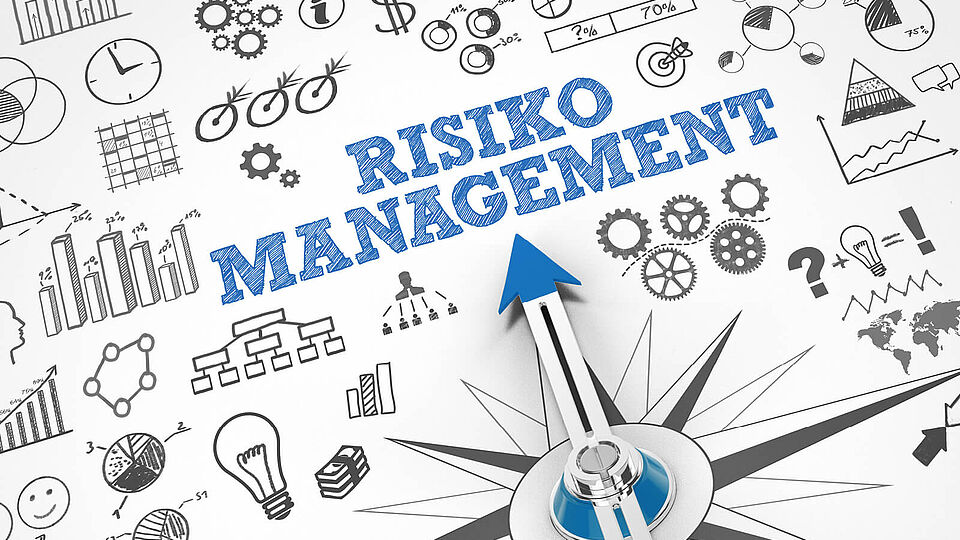The Supply Chain Act obliges companies to comply with and implement human rights and environmental standards along their global supply chains. This development brings with it both challenges and opportunities and requires a rethink in the design and monitoring of supply chains.
Key points of the Supply Chain Act
The Supply Chain Act (Supply Chain Due Diligence Act) aims to ensure compliance with human rights and environmental standards along global supply chains. Companies must now fulfill due diligence obligations, ensure transparency and reporting on supply chain activities and are responsible for potential violations by their suppliers. This entails increased responsibility and liability as well as the need to disclose their own supply chains and those of their partners.
The results of a study by the German Association of Materials Management, Purchasing and Logistics (BME) and the risk management company Integrity Next illustrate the gaps in companies: Of those surveyed, only 38 percent of companies feel sufficiently well prepared in the area of risk management and 29 percent in the area of risk analysis.
Challenges in risk management
- Complexity of supply chains: Global supply chains are often long, multi-layered and complex. Companies have to monitor many suppliers in different countries, which makes it difficult to identify risks.
- Lack of transparency: Limited insight into supply chains and gaps in knowledge about the actual conditions at production sites and (sub) suppliers make it difficult to identify potential risks.
- Liability risks: The extension of liability to (sub) suppliers means that companies can also be held responsible for violations of human rights and environmental standards by their suppliers.
Opportunities in risk management
- Early identification of risks: Effective risk management enables the early identification of problems and violations in the supply chain.
- Stronger cooperation in the supply chain: The Supply Chain Act promotes close cooperation and communication between companies and their suppliers.
- Strengthening corporate reputation: Transparent supply chains and active measures against human rights violations and environmental damage can strengthen a company's image.
Our tips for compliance with the Supply Chain Act
- Carry out a thorough risk analysis: Identify potential risks and vulnerabilities.
- Communicate transparently with suppliers: Open and transparent cooperation.
- Strengthen sustainability and social responsibility: Minimize risks and promote compliance with standards.
- Carefully review contracts: Raising suppliers' awareness of risks.
- Use technology-based solutions: Increase efficiency and transparency in risk management.
Improving risk management through the Supply Chain Act
The Supply Chain Act can change the corporate culture and place greater emphasis on sustainability and social responsibility. The integration of sustainability aspects into corporate strategy and supply chains becomes necessary, and potential cost savings and efficiency gains can be realized.
Risk management with PSIglobal
PSIglobal supports companies in implementing the Supply Chain Act and in effective risk management. The software provides transparent visualization and analysis of supply chains and offers various Supply Chain Network Design (SCND) functions for optimizing network structures as well as sourcing and distribution strategies.
Functions and benefits
- Optimization of supply chain structures
- Optimization of sourcing and distribution strategies
- Transparent visualization and analysis of costs, service and sustainability in the supply chain
- Promotion of cooperation between companies and suppliers
Scenario analysis with PSIglobal: adapting the supply chain for resilience and efficiency
The following use case is about an example company who supplies around 10,000 customers in Europe through 10 suppliers in Asia and Europe via 6 port locations and 3 European central warehouses. With the help of PSIglobal, various scenarios for customer delivery are to be created and compared with each other.
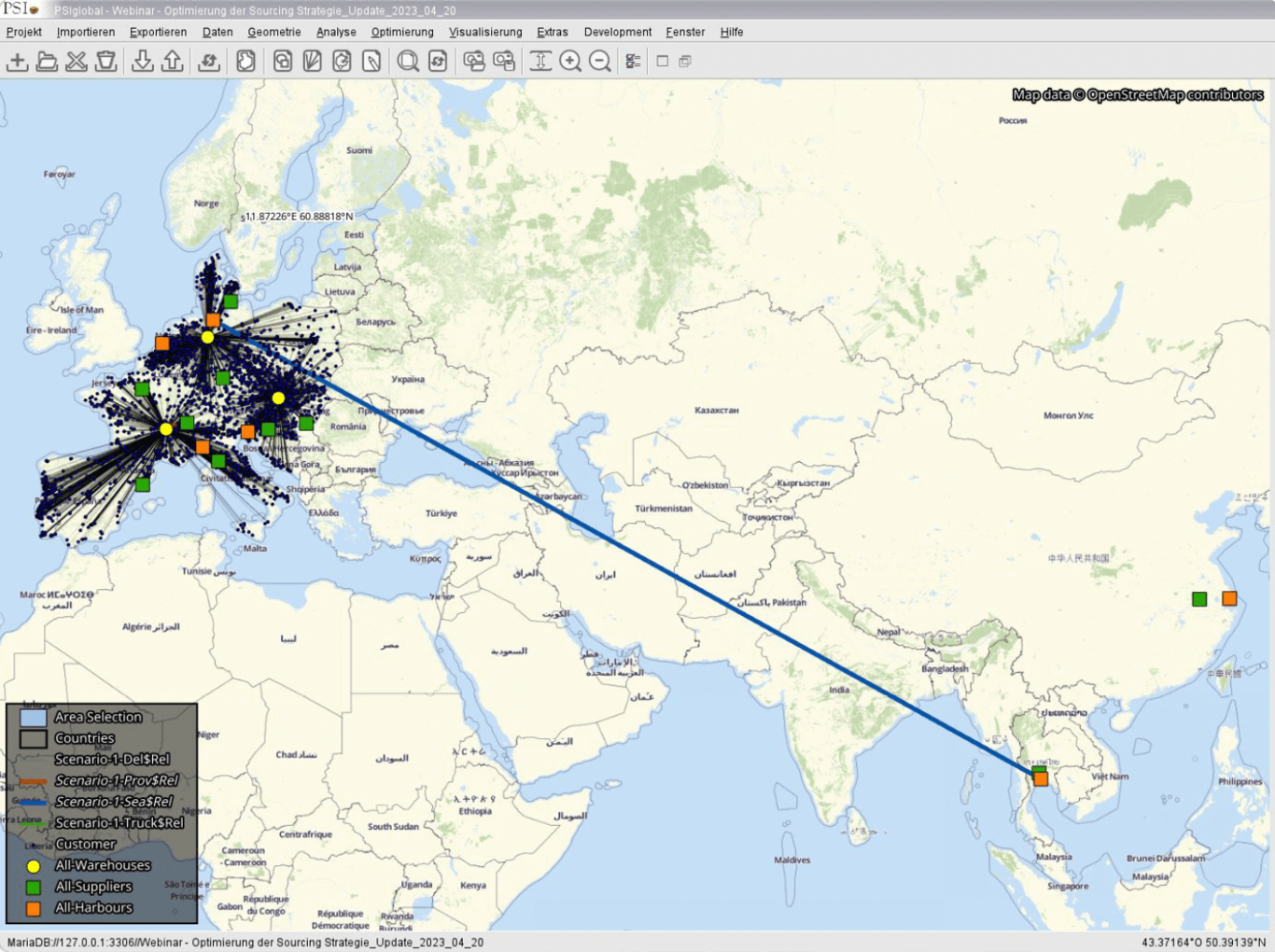
Scenario 1: The optimal reference scenario
Companies face the challenge of remaining cost-efficient despite the uncertainties caused by various risks (pandemic, natural disasters, trade conflicts, etc.). In a reference scenario, the capacities of all suppliers are initially not limited, which enables a solution with the lowest overall costs. In this case, PSIglobal chooses a supply from Asia for part of the delivery area.
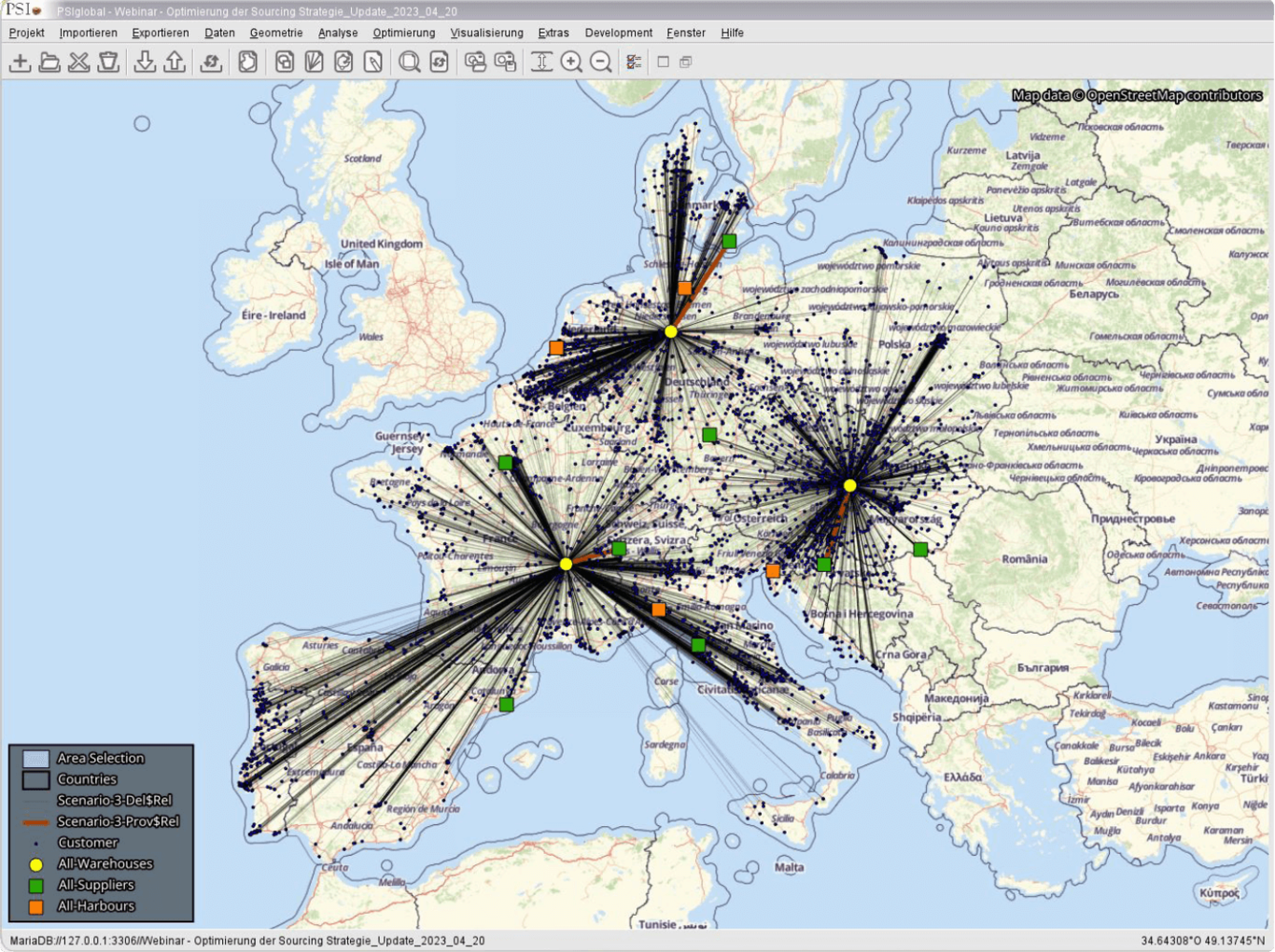
Scenario 2: Local sourcing strategy
The pandemic has prompted many companies to reconsider their dependence on suppliers in Asia. In this scenario, deliveries from Asia are therefore dispensed with and a local sourcing strategy is implemented. PSIglobal plays a key role in realigning with European suppliers and improving risk management in the supply chain.
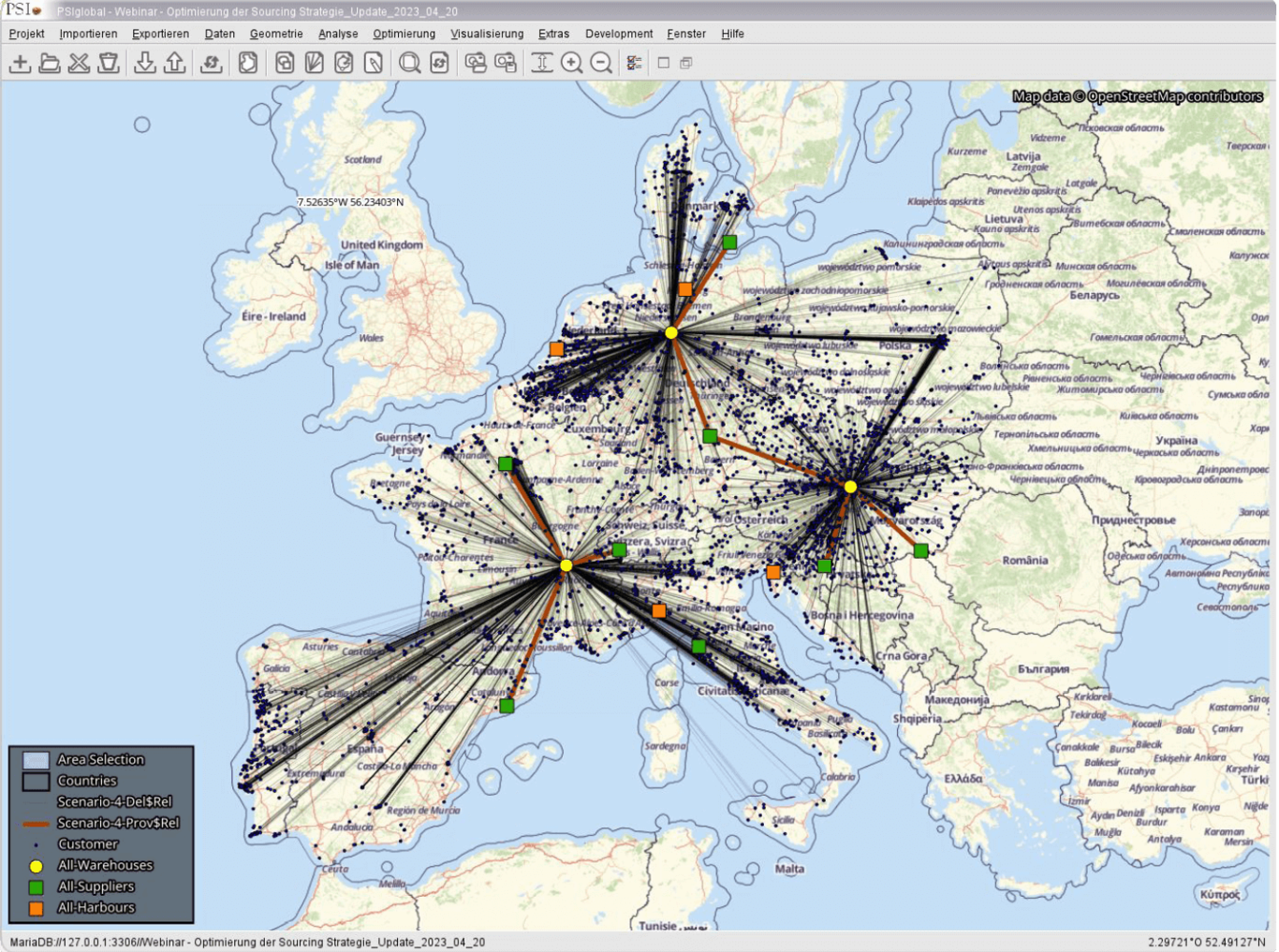
Scenario 3: Multiple sourcing in Europe
To ensure even greater resilience and security in production and supply capability, PSIglobal supports companies in diversifying their production sites within Europe. This scenario shows how the use of multiple production sites in Europe can further spread risk and make the supply chain even more resilient.
The following cost comparison shows how the delivery strategy affects supplier, storage and transportation costs.
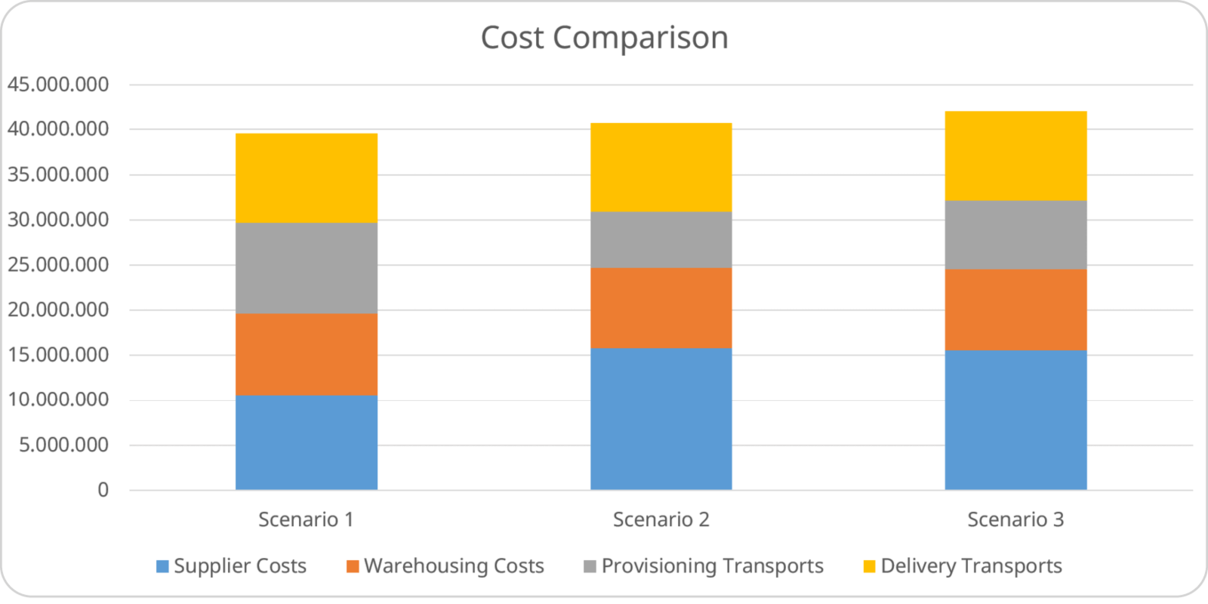
Significance for the Supply Chain Act
These use cases demonstrate how PSIglobal helps companies to optimize their supply chains in the face of the challenges posed by the Supply Chain Act and external shocks such as the coronavirus pandemic. The ability to respond quickly and efficiently to changes not only improves compliance with the Supply Chain Act, but also strengthens the resilience and competitiveness of companies.
Executive summary
The Supply Chain Act requires companies to carefully analyze their supply chains, identify risks and take effective measures. This makes active risk management a strategic success factor. Companies can overcome challenges, strengthen their social responsibility and improve their reputation through proactive management and the use of software solutions such as PSIglobal.
The software can help with supply chain compliance. Based on identified risks in the supply chain and the resulting sourcing strategies, it can be used to run through various customer supply scenarios and optimize them in terms of cost, delivery time and sustainability. The Supply Chain Act means that companies' responsibility no longer ends at their own factory gates, but continues along the entire supply chain - PSIglobal allows the entire supply chain to be monitored, analyzed and optimized.
Our recommendations for action include a thorough risk analysis, the strengthening of supplier relationships, the implementation of software solutions and the development of a sustainability strategy, resulting in a stronger corporate culture. With PSIglobal, companies can meet the requirements of the Supply Chain Act, minimize socio-ecological risks and achieve their sustainability goals. The integration of technology-based solutions into risk management is essential for long-term success.



